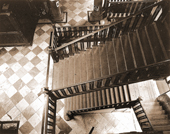 |
| The staircase of Temple Chambers. Picture by Christopher Taylor |
Shankar’s half-a-century-old evergreen Koto Ajanare contains a passage describing Temple Chambers at 6 Old Post Office Street, opposite Calcutta High Court, where as a young man struggling to eke out a living, he had worked as the babu of Noel Fredrick Barwell, the last British barrister to practise here. “It is difficult to tell the building’s age…. It is a large building. Just like a beehive — with attorneys cooped up in each cubicle. Sunlight cannot enter many rooms, so the electric supply company prospers… The lift has a musty odour. It is an antediluvian contraption. If more than three people wish to use it together, there is every possibility of ascending to heaven straightaway. Black-coated attorneys, barristers carrying their black gowns…” wait for their turn to get into the lift.
Temple Chambers has changed very little over the years. Only, barristers are not seen any longer, and more and more women in black or grey saris, salwar kameez or pant suits are joining the profession. The building has survived two fires. Less than a decade ago, it had been declared a condemned building. But it is back in form, and even the staircase with two wings extending to the floor above on each of its five marble-lined floors has been renovated. The offices of some of Calcutta’s most eminent law firms are housed here. Families of legal luminaries have been attached to these for generations, five in the case of the late Pratap Chandra Chunder’s family.
Former mayor Kamal Basu, 90, says in all probability, the building was constructed in 1914, when his grandfather’s firm, BN Basu & Co, shifted here from its 10 Hastings Street (today’s Kiran Shankar Roy Road) office. His grandfather, Bhupendra Nath Basu, had founded Mohun Bagan club here. The grotty office is still located on the third floor. As a student, Basu used to drop by to meet his uncle. Besides Kamal Basu, two other former mayors worked out of Temple Chambers — BK Basu (1928) and, Nirmal Chandra Chunder (1953). So does Bikash Ranjan Bhattacharjee, the current incumbent.
The offices of many of these firms that once belonged to single families, are now shared by several lawyers who work independently. Amal Sen’s chamber is still located in the space occupied by the firm of his maternal grandfather, BN Basu, but he works on his own and pays chamber fees for the cubicle he occupies.
Avijit Deb, who belongs to the family of legal eagles of Thanthania, says he has been frequenting the building for a long time, and the GC Chunder & Co office, from where he works, was earlier a corridor lined with the chambers of advocates and counsels on one side and open space for the staff on the other. His office is neat with shelves on one wall, where each legal brief is carefully docketed, quite unlike the heaps of dusty files one expects to come upon in old law offices.
The only firm with a foreign-sounding name now dominated by mostly Bengali partners is that of Victor Moses & Co. Asok Kumar Ghosh, a senior partner of the firm, says it was founded by Victor Elias Moses, who became an attorney in England in 1930. A man who led a humble life, Moses died in London in 1987, within days of leaving Calcutta. This is definitely the smartest office in Temple Chambers with cherry-coloured walls and glass dividers.
But SC Ghosh & Co, which Asokebabu inherited from his family, is stacked with files the old-fashioned way. The late Pulak Chandra Das’s office commands a striking view of the Assembly. The oldest lawyer, who still makes daily visits to his sprawling office, is the 98-year-old Nathmal Himatsingka. Still ramrod straight, he says with a smile that he has been a regular here for 75 years. His predecessor, Prabhu Dayal Himatsingka, was a regular till age 102.










